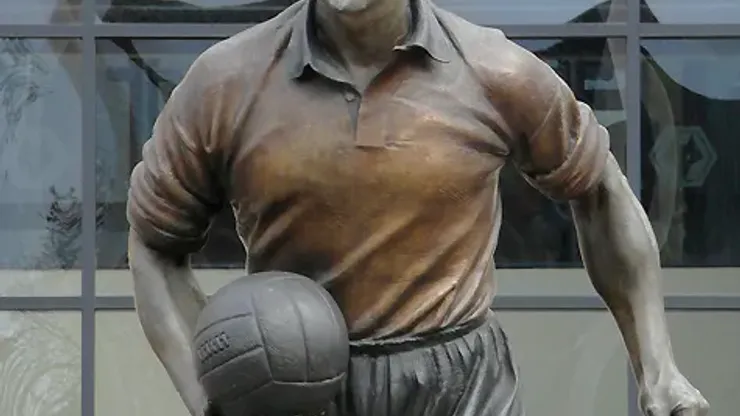If one player ever encapsulated the prestige, honor and sacrifice that being a one club man, then few could match the career of Billy Wright. Like Dean and Matthews, he set standards and records without batting an eyelid. In these modern days of superstar footballers, loathed and loved in equal measure, Wright personifies a halcyon era when respect and honor went hand in hand. Universally loved around the country, there wasn’t a dry eye in the house for his final match.
Wright was another of the great stars of English football, whose career, whilst magnificent, could have been even greater if it were not for the outbreak of World War II. Given his first team debut in 1939 at only 15 years of age and he signed a full time contract in 1941, but as with all league football at the time, it would be another 5 years before he pulled on the old gold and black kit and became enshrined in a unmatched period of success for Wolverhampton Wanderers.
It had been his performances throughout the war that brought him to the attention of both the F.A and Wolves and his career took off immediately after he had been de-mobbed from the Army in 1946. He’d been a Physical Education Instructor as well as playing representative games and had earned a reputation as one of the best defenders in the world. He was joining a side that had closed the two seasons prior to the outbreak of war finishing as runners up in the First Division and also lost the F.A Cup final to Portsmouth in 1939.
By now Wright has become England captain as well and held the position in every remaining game he ever played for his country. During the next ten years Wright would lead Wolves to 3 league titles, 3 runners up places and 3 third places as Wolves became synonymous with footballing success. Along with Manchester United, they were the team of post war Britain and it often came down to which of the two would hold their nerves the longest.
Wright’s talent as a footballer was that whilst he was noted for his hard, even ferocious tackling, he still played the game fairly and as a true sportsman. As he was never booked or sent off in his career, it’s rare thing for a defender to go their entire career without at least one blemish on their record. Despite being only 5′ 8″ he was almost unmatched in aerial battles, with an uncanny ability to be seemingly able to levitate when he jumped for the ball, the Michael Jordan of his day.
Wright then became even more of a household name; if that were possible, when he married Joy Beverley, from the 50’s pop group The Beverley Sisters. As Britain’s premier female group and the first British female group to break in to the American top ten, it was similar to the England captain marrying a member of the Spice Girls. Make no mistake about it, they were massive. On his way to the secret location for the wedding in Poole in Dorset, Billy and Joy ran into a traffic jam. When he asked a police officer what on earth had gone on to make everyone queue so long, the officer just laughed and said “They’ve all come to watch you two get married.” Thousands turned out for the “Secret wedding”
Wright finally retired in 1959 as Wolves won the league title for the last time in their history and was awarded the CBE after announcing his retirement. He had a year off before becoming the manager of England’s youth, Under 21 and Under 23 sides but left in 1962 to become the manager of Arsenal, guiding them into 7th place in his first season and gave them their first ever season of European football.
Yet things didn’t quite work out for him at the Gunners and he was sacked in 1966, moving into television as Head of Sport for ATV, a post he held for over 20 years. He retired in 1989 and the year after joined the board of directors following Sir Jack Hayward’s purchase of Wolverhampton Wanderers. Sir Jack paid him the ultimate honor of naming one of the stands after him, an obvious, yet fitting tribute for such a player. When people think of Wolves, they think of Stan Cullis, Steve Bull and Billy Wright. Sadly, Billy passed away much too soon, as stomach cancer claimed him in 1994. My grandfather cried all day when he heard the news.
- First player in world football to earn 100 caps for his country
- Played 70 consecutive international matches
- Captained England 90 times
- Amazingly missed 7 seasons due to the Second World War
- Captained England in 3 consecutive World Cups (1950, 1954, 1958)
- Never booked or sent off
- England 5th most capped player with 105 caps and 3 goals
- 541 games and 16 goals for Wolves
200+ Channels With Sports & News
- Starting price: $33/mo. for fubo Latino Package
- Watch Premier League, Women’s World Cup, Euro 2024 & Gold Cup
The New Home of MLS
- Price: $14.99/mo. for MLS Season Pass
- Watch every MLS game including playoffs & Leagues Cup
Many Sports & ESPN Originals
- Price: $10.99/mo. (or get ESPN+, Hulu & Disney+ for $14.99/mo.)
- Features Bundesliga, LaLiga, Championship, & FA Cup
2,000+ soccer games per year
- Price: $5.99/mo
- Features Champions League, Serie A, Europa League & Brasileirāo
175 Premier League Games & PL TV
- Starting price: $5.99/mo. for Peacock Premium
- Watch 175 exclusive EPL games per season






